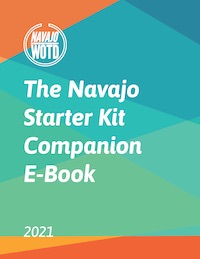bilasáana
apple
bill lah sah nuh
The Navajo word bilasáana refers to the apple in English.
The origin of the word is not concrete, but it is thought to be an adaption of the Spanish word manzana. It’s remarkably similar to the Navajo word bilagáana, which is also thought to be of Spanish origin.
Following yesterday’s examples for tó, you could say bilasáana bitoo’ to refer to apple juice. Yum.
